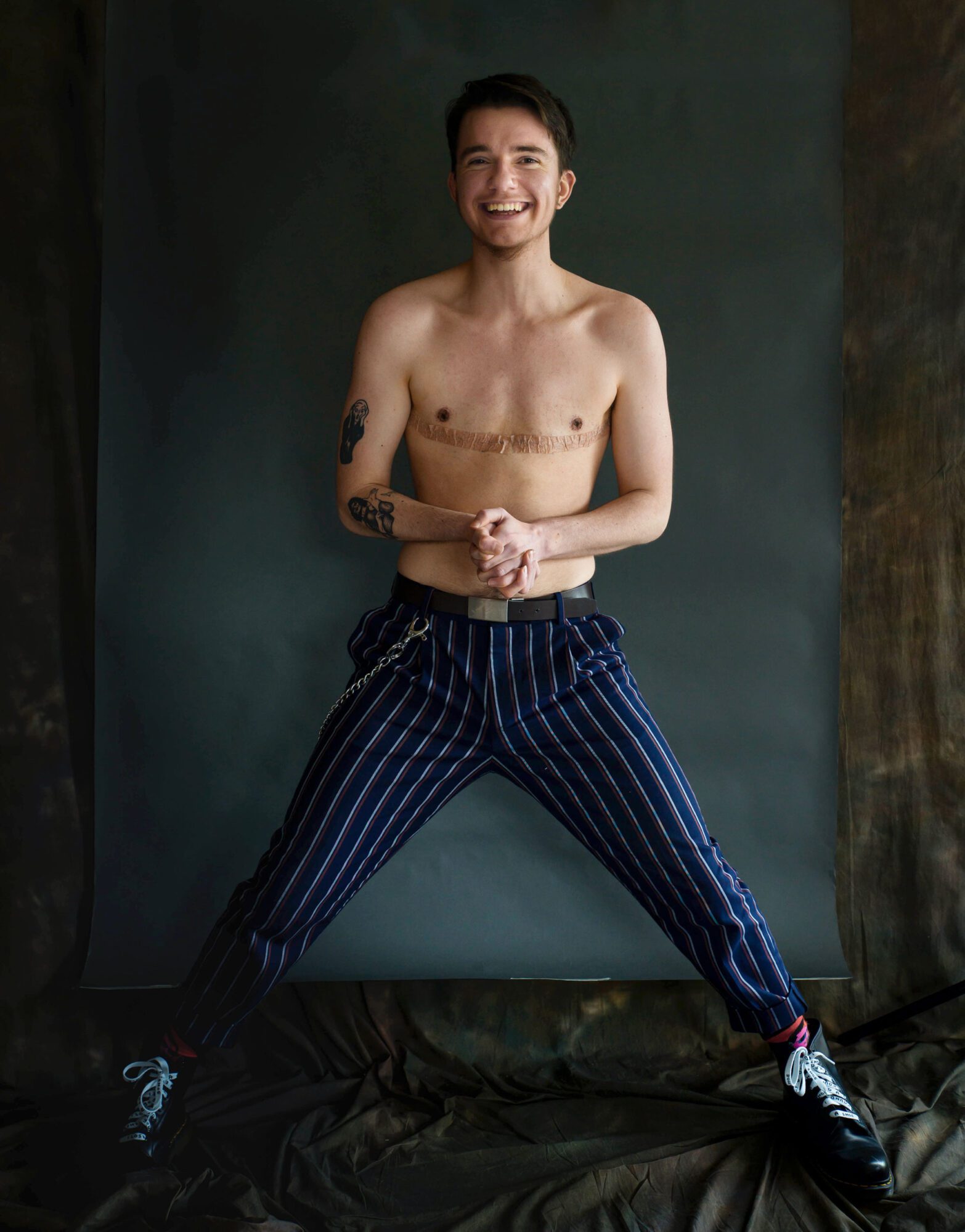In his final year of design school, Theo Press was working on a project about protest art. The idea, he says, was to centre the project around major protest movements from the past few decades. However, the protest story that unfolded turned out to be much more of a personal one.
Press is a transgender man and when the date for his double mastectomy (also known as ‘top surgery’) landed in the middle of his semester, he decided, with the help of his photographer uncle, to document his journey.
“Transitioning is a protest in itself. That was the landing point for my ‘Self Made Man’ project,” he explains. “A lot of people don’t know a trans person in real life. The core idea was presenting my transition to people who had never seen anything like it before. It was about lowering the barrier of entry to understanding the trans experience.”
Press grew up in Wellington and was around 18 years old when he first started to think that he might be trans. “I never thought there was anything wrong with me. I was kind of a tomboy when I was younger anyway,” he says. “It wasn’t until I got to university that I realised how uncomfortable with my gender I was.”
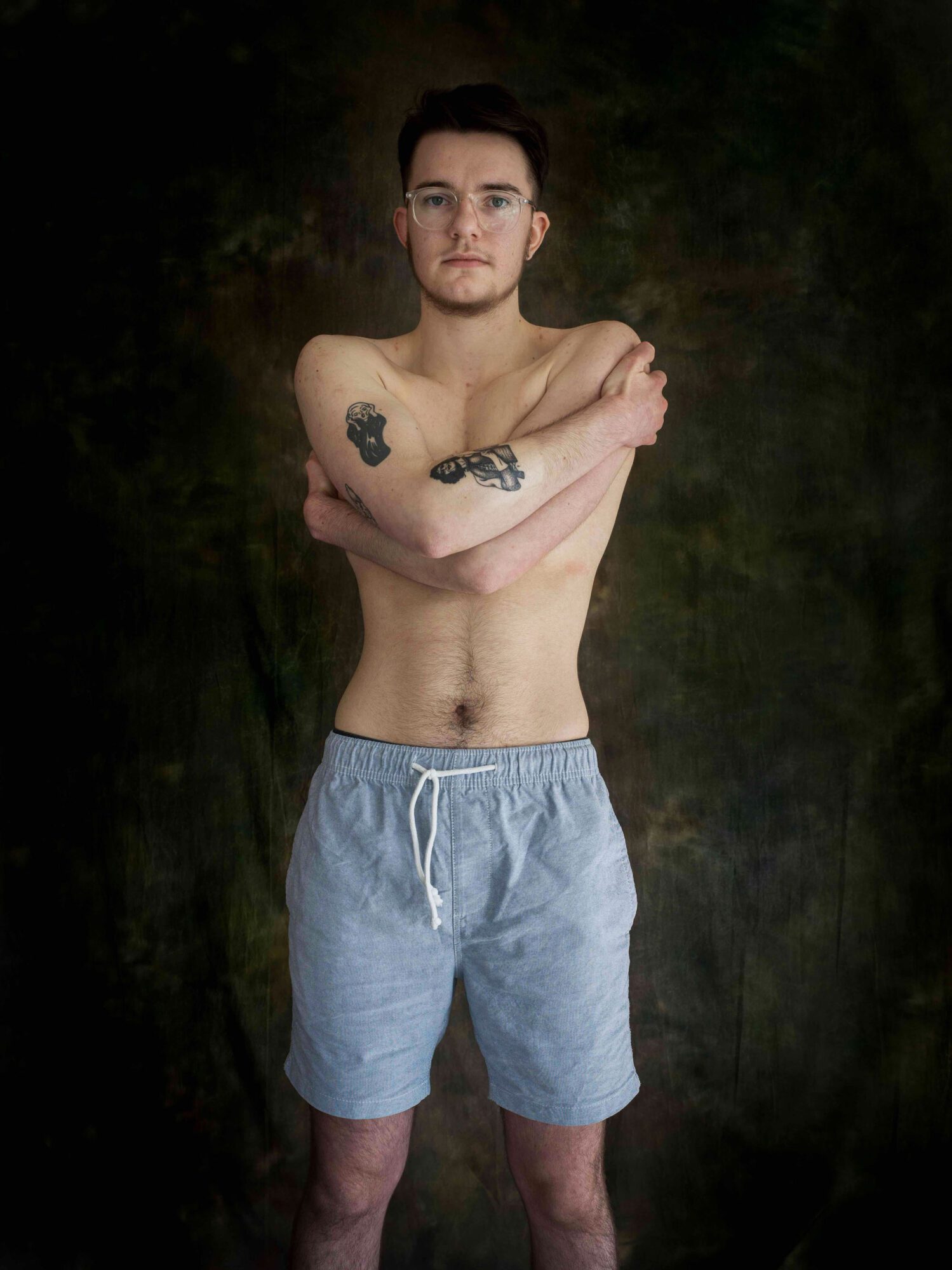
Around the same time, he began to experience severe social anxiety. Going out for a meal or drinks with friends would make him feel nauseous and throw up. At a time when most young people are busy socialising, Press struggled to maintain many of his friendships. This went on for two years. The moment it stopped was the moment he finally came out as trans.
“In a way, it was completely out of the blue. I had thought about it a little bit, but hadn’t decided to say it. I was in my mum’s bedroom and my sister said a friend wanted to know what pronouns I used. I just started crying my eyes out. I said to my mum, ‘I’m transgender’. As soon as I said it, I was so relieved. It was like the anxiety just evaporated.”
After coming out, Press started researching about how to transition. He soon realised there was a lack of resources for transgender New Zealanders. “I had no idea about transitioning in New Zealand or what steps I had to take,” he says. “A lot of the information I got was from the NHS in the UK. There are only a couple of pages on the New Zealand Ministry of Health website for transgender people to learn about gender surgery.”
Beginning the journey
Starting on hormone therapy was an exciting step in Press’ transition. “After about two months on testosterone, my voice dropped. That was pivotal. It was like the missing piece that was getting misgendered all the time. I don’t get misgendered anymore which is great.”
Six months into his transition, Press started looking into top surgery. Government websites proved to be of little help, so he asked for recommendations for New Zealand surgeons on an online forum for trans men. A recommendation led him to Wellington-based surgeon, Dr David Glasson. “It’s a bit of an oxymoron because David is actually a breast augmentation surgeon, but because the Wellington district health boards are so badly funded, he ends up doing a lot of private top surgeries,” explains Press.
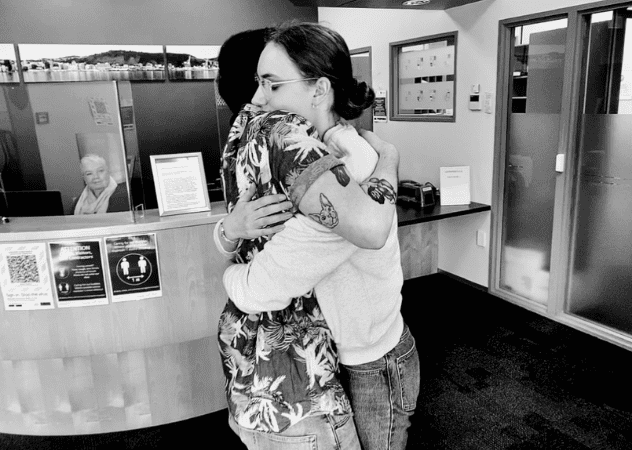
On 31 August 2020, with his girlfriend, Hannah by his side, he went in for his top surgery. The whole experience, he says, was relatively smooth, mostly due to the fact that he had a great support system and could afford to have the surgery done privately, rather than joining the long wait list in the public healthcare system.
Press knows he is lucky. “I was very fortunate to have parents who could pay for half the cost of my surgery. I feel I didn’t get the ‘genuine’ experience in New Zealand, purely because I went private. A lot of what I’ve heard about the public system isn’t great. People have to wait months and months for a surgery date, let alone the actual surgery.”
In November 2020, an RNZ analysis found that access to gender-affirming healthcare for trans women and men in New Zealand differs dramatically between district health boards. This means many Kiwis have to travel long distances to access services such as breast augmentation, chest reconstruction and voice therapy. According to the 2019 ‘Counting Ourselves’ survey, one in 10 people who accessed gender-affirming care needed to move to another part of the country to get it.
Many others report experiencing financial barriers, long wait times and a lack of information about what healthcare they can access.
Despite being very open about his experience, Press says he is quite guarded about his emotions. Photographing and journalling his experience allowed him to lean into his own vulnerability and strength. “I wanted to challenge myself with what I was willing to reveal,” he says. “It was also about helping other trans men by seeing their experiences, and sharing them with others who may have no knowledge of what it’s like to be trans.”
Undergoing surgery
It took six weeks for him to make a full recovery from the surgery. At times it felt strange, the tightness of the bandages creating a sensation that his chest was sliding off, but the strangeness subsided to an immense sense of relief.
“It feels so natural now. Every time I see myself in a shop window I think I must have looked so strange before.”
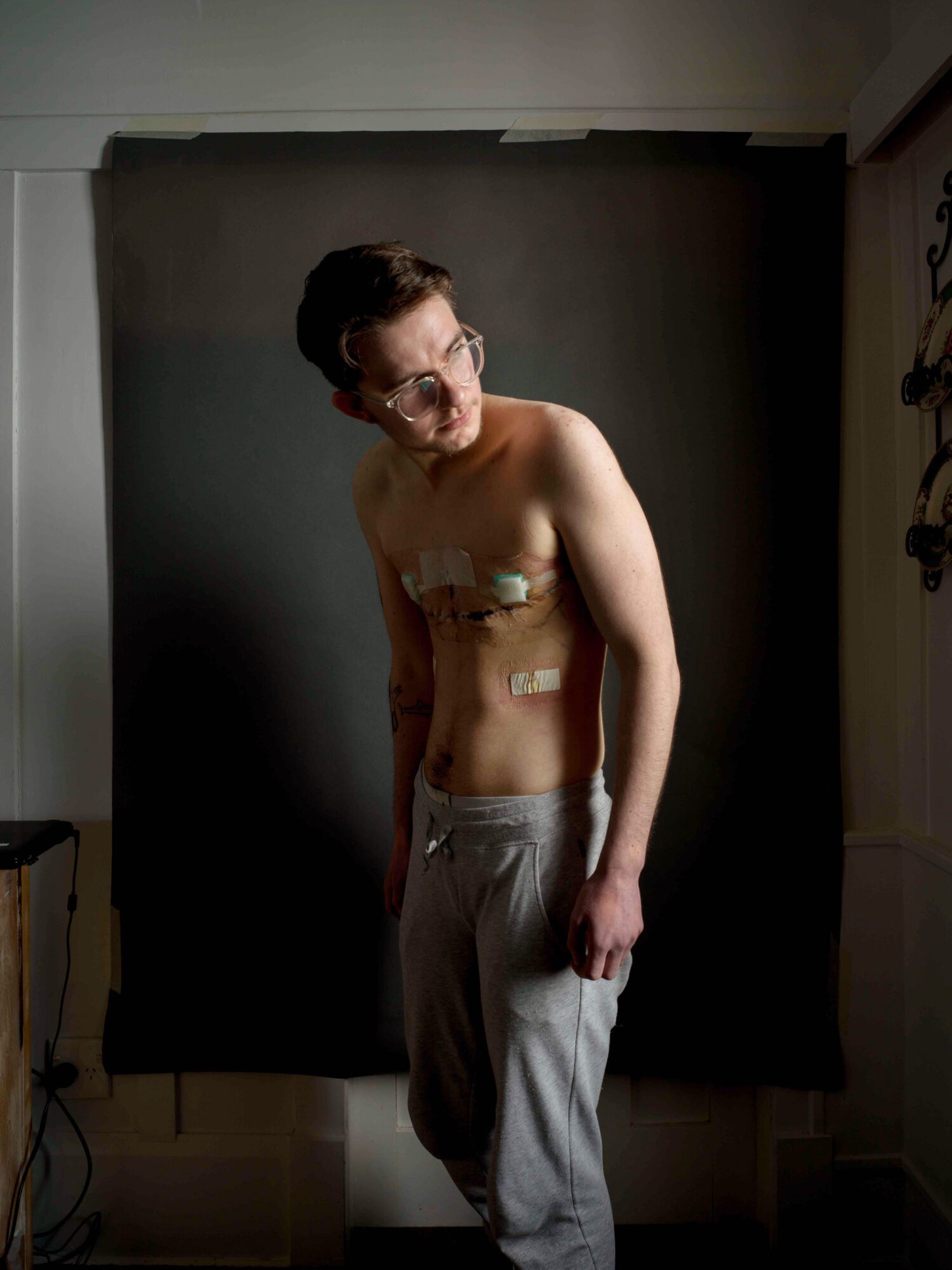
Press says the surgery has given him back a sense of freedom.“I hadn’t gone swimming in so long, now I can go to the beach and swim.” Press is grateful to have the love and support of his family and girlfriend, Hannah, throughout his transition.
“Hannah has always been open minded. We started dating when we were 14 and I talked to her about the possibility of being gender fluid when I was 15. She was really supportive when I decided to transition and was there throughout the whole surgery to help with the recovery.”
Press’ parents and extended family have been equally as supportive. “My mum and dad love having a trans son. They’ve always treated me the same, even after I transitioned. Even in the older generation, I see it’s becoming more acceptable. My grandma, who grew up in a really conservative Catholic family, loves it. I think as soon as you know someone who is trans, it changes things. ”
A self-described optimist, Press says he’s learned how to deal with everyday prejudice and transphobia with an unapologetic attitude. “If anyone tries to offend me for being trans, it’s just not going to work. I’m not going to be trodden on because of my gender identity.”
For those who struggle to understand, he likes to explain in simple terms. “I look at it in terms of biology. There are so many things that can go wrong in the first few weeks of pregnancy. The only thing that went wrong with me is that I had the wrong body to brain. Things go wrong all the time in nature, and we have this ability to change so why not do it?”

Rewriting the narrative
While positive, he doesn’t ignore the fact that trans New Zealandersstill face many discriminations and challenges, be it in the healthcare system or through the way they are represented in the media.
“Often what you see in the media about trans people, and trans men in particular, is really negative. I don’t think it helps anyone. Trans men are often underrepresented and when you do hear stories, they paint us in such a horrible light. They tell us that by taking testosterone and giving up the femininity of ‘womanhood’ turns us into horrible, aggressive, nasty men, which is just not true.
“I don’t have anger issues. Often, it’s the other way around. People are angry because they’re hiding who they are, and when they start to transition they become much happier,” he says. “I think those messages can be especially harmful for parents. They might think that if their kid is trans, they’re going to have all these issues, and push that fear onto the child for wanting to transition. That would do a lot more harm than testosterone ever would.”
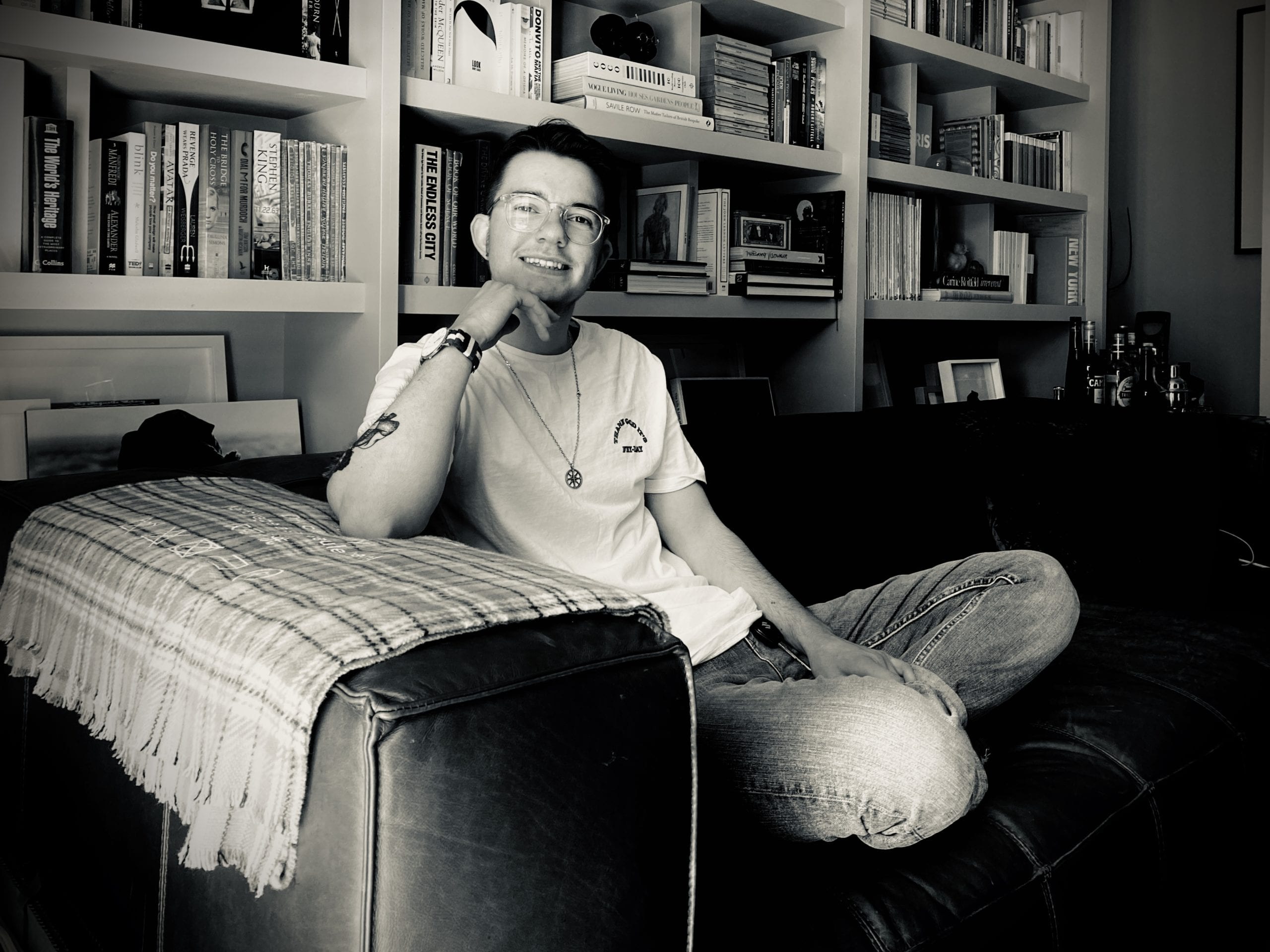
By taking control of his own story and putting his transition out there for the world to see, Press hopes to push back against stigma and rewrite the narrative. “Telling positive trans stories is so important. I love who I am. I think being trans and happy is my own act of protest.”
Helpful resources
To learn more about healthcare and support for transgender New Zealanders, including hormone therapy, voice therapy, gender-affirming surgeries, counselling, mental health services and support networks, visit health.govt.nz


